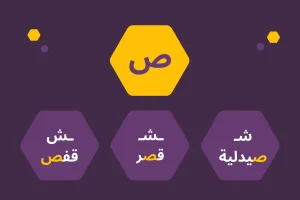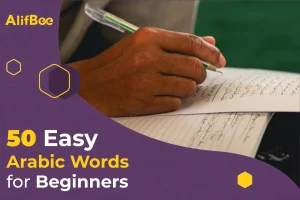
Welcome back to a new blog that will hopefully bring you interesting information about the Arabic Language. Today, we are going to explore 10 Arabic proverbs with body parts like the eye, ears, heart, hands, and tongue.
Like all languages, Arabic is rich with idiomatic expressions and well-known proverbs that reflect the traditions and thinking of the Arabic culture. In the proverbs and expressions we will examine today, words from the body are not usually used in the literal sense and can refer to deeper meaning.
These proverbs carry great wisdom in very short messages that we will happily share with you and explain while giving you similar proverbs in the English Language.
Arabic Proverbs with Body Parts
Proverb 1: العَيْنُ بَصِيْرَةٌ واليَدُ قَصِيْرَة
So near and yet so far
Alʻaynu baṣīratun wālyadu qaṣīrah
The first proverb uses two body parts, namely: the eye العين and the hand اليد. The literal meaning of the proverb is “The eye can see, but the hand is too short”.
This proverb is used to express the speaker’s helplessness in the face of problems and in situations where things are out of our control. In English, we have this similar expression “So near and yet so far”.
Proverb 2: أُذُنٌ مِنْ طِيْنٍ وَأُذُن مِن عَجِين
In one ear and out the other
Udhunun min ṭīnin waʼudhun min ʻajīn
This proverb makes use of the body part we use for hearing: the ear الأذن, and its literal meaning is “One ear is made of clay and the other of dough.” This expression is usually used to make a critical remark about someone who is not listening or paying attention to what people are telling them.
Everything that is said to them is, metaphorically speaking, not capabable of reaching their ears as one is blocked by clay and the other by dough.
In English, this expression is used to give a similar idea: “In one ear and out the other.” (One ear is made of clay and the other of dough.)
Proverb 3: لِسَانُكَ حِصَانُكَ إِنْ صُنْتَهُ صَانَكَ وَإِنْ خُنْتَهُ خَانَكَ
Your tongue is your worst enemy
Lisānaka ḥiṣānuka in ṣuntahu ṣānaka waʼin khuntahu khānaka
Our third expression is about the body organ that helps us speak and articulate our thoughts: the tongue اللسان. According to this proverb, someone’s tongue is, in a way, like their horse. If you preserve it, it preserves you and if you betray it, it betrays you.
The literal translation of the proverb is: “Your tongue is your horse—if you take care of it, it takes care of you; if you betray it, it betrays you”.
There isn’t in English a proverb with the exact same message, but the closest equivalent to warn of the consequences of using your tongue recklessly is: “Your tongue can be your worst enemy”.
Proverb 4: يَدٌ وَاحِدَةٌ لا تُصَفِّق
It takes two to tango
Yadun wāḥidatun lā tuṣaffiq
This proverb refers to another important body part, which is the hand اليد. It talks about the role of cooperation and its importance in getting things done.
The literal meaning of the proverb is “One hand cannot clap,” which indicates the helplessness of efforts if done without the cooperation of others, especially for tasks that require group work. The message resonates with a similar English proverb: “It takes two to tango.”
Proverb 5: العَيْنُ لا تَعْلُو عَلَى الحَاجِب
Respect your elders/Know your place
Alʻaynu lā taʻlū ʻalá alḥājib
This is a common proverb in Arabic that includes two body parts: the eye العين and the eyebrow الحاجب. You use it to show humility and respect to people you hold in high esteem and to express respect and acknowledgment of the other party’s status or position.
It’s a way of showing recognition of someone’s superiority or importance in a particular context, emphasizing humility and respect for the natural order or hierarchy.
An English equivalent that conveys a similar meaning might be “Respect your elders” or “Know your place,” both of which acknowledge the importance of respecting hierarchy and understanding one’s position in relation to others.
Proverb 6: القَلْبُ عَلَى القَلْب
Heart to heart
Alʻaynu lā taʻlū ʻalá alḥājib
In Arabic, the word “قَلْب” means “heart,” which is often used metaphorically to represent emotions or feelings, similar to its use in many other languages. The expression “القَلْبُ عَلَى القَلْب” could be interpreted literally as “heart upon heart.”
This might suggest a close emotional connection or deep empathy between people, where one person’s heart (or feelings) is closely aligned or in harmony with another’s. Three expressions in English can give a similar meaning, “Heart to heart,” “to be on the same wavelength” and “great minds think alike”
Proverb 7: قَلْبُهُ كَالحَجَر
To have a heart of stone
Qalbuhu kālḥajar
The Arabic proverb is also using the word قلب but to mean something negative. The expression “قلبه كالحجر” translates to “His heart is like a stone.” This is a metaphorical expression used to describe someone who is very hard-hearted, unfeeling, or unsympathetic.
The English equivalent of this proverb would be “His heart is as hard as stone” or “He has a heart of stone.” These expressions similarly describe someone who lacks compassion, empathy, or emotional sensitivity.
Proverb 8: البَعيدُ عَنِ العَينِ بَعيدٌ عَنِ القَلب
Out of sight, out of mind
Albaʻydu ʻani alʻayni baʻydun ʻani alqalb
This Arabic idiom uses the words عين and قلب to talk about personal relationships and the effect of distance on them. It conveys the idea that people tend to forget about others or stop thinking about them if they are not physically present or visible for some time. The literal translation is: Those who are far from the eye are far from the heart.
It reflects the human tendency to be more concerned with what is immediately perceivable or what is currently happening in one’s own life, and less with those who are distant or not directly involved in one’s day-to-day experiences.
This phrase can be applied to both personal relationships and other matters that require attention. The English equivalent is very similar: “Out of sight, out of mind.”
Proverb 9: عُصفورٌ باليد خَيرٌ مِن عشرةٍ على الشّجرةِ
A bird in the hand is worth two in the bush
ʻUṣfwrun bi-al-yad khayrun min ʻshrtin ʻalá alshshjrti
This Arabic proverb uses the word يد “hand” to take about avoiding risking what you have in your hands. It says that it is better to hold onto something you already have (a bird in your hand) than to risk losing it by trying to obtain something better or more (two birds in the bush).
It emphasizes the value of certainty and the potential risk of losing what you have in pursuit of more. The English equivalent is almost the same “A bird in the hand is better than ten on the tree”.
Proverb 10: مَن أكل على ضِرسِه نفع نَفسه
God helps those who help themselves
Man akala ʻalá ḍirsih nafaʻa nafsh
This Arabic expression implies that self-reliance, especially in the context of providing for oneself, is beneficial. Eating “on his molar” can be interpreted as taking responsibility for oneself, particularly in matters of sustenance or self-care.
The proverb underscores the importance of self-sufficiency and the direct benefits that come from being responsible for one’s own needs. In English, a similar message can be read in this expression: “God helps those who help themselves.”
Final word
Now you have learned 10 Arabic expressions that use words from the body to express wisdom from the Arabic culture about negative human traits, harmony in relationships, the importance of cooperation, and reactions to life situations. They will help you use idiomatic phrases in your everyday interactions. If you like learning proverbs that use body parts, you will surely love our blogs that focus on verbs or actions that are related to body parts. Read about hand-related verbs, eye-related verbs and leg and feet-related verbs.
Also, you can use our planner to help boost your learning journey. We have carefully designed this planner to include a rich 30-page worksheet as well as over 200 practical exercises and activities. It provides a powerful tool to back your acquired knowledge and newly learned language and push your learning journey forward with loads of practice opportunities.
Last but not least, make sure to downlaod our AlifBee App and join millions Arabic learners on a fun and engaging learning experience.




